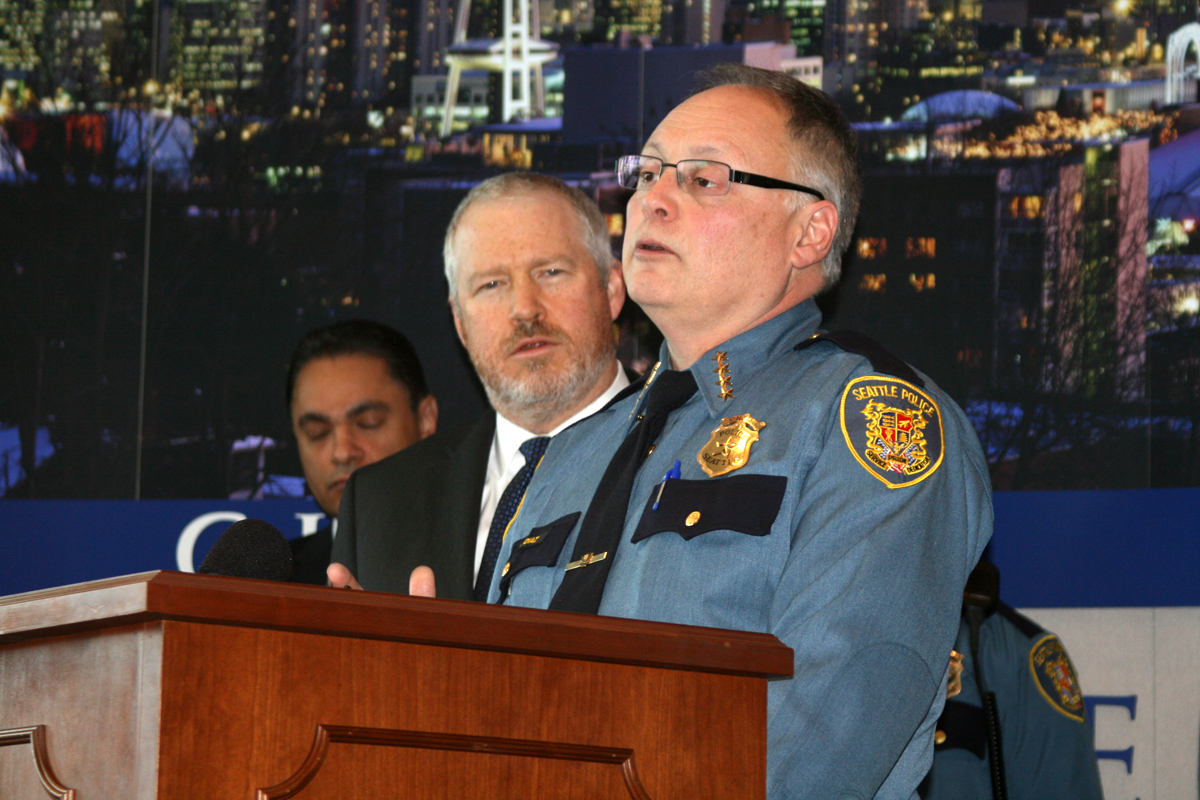As he took to the podium at a City Hall press conference this afternoon to announce his retirement, Seattle Police Chief John Diaz told the kind of poignant personal story that the public loves. Growing up in a family of Mexican immigrants, “English was a second language for us,” he said. That he had risen to the highest rank of police command in one of the biggest cities in the country was an amazing thing, he continued, and it had changed his family members’ perceptions about law enforcement.
One might wonder how it could have changed the perceptions of the Seattle public at large had it been more widely known. “I encouraged him many, many times to tell his story—and that of the police department,” acknowledged Seattle City Councilmember and mayoral candidate Tim Burgess in an interview after the press conference.
But as we reported back in February, Diaz has avoided the limelight. Self-effacing, with a strong belief in giving his subordinates autonomy and credit for the work they do, he has let other members of his command staff take the lead in speaking before the public. Even today, opening up more than usual, he was characteristically soft-spoken. Sitting in the front row, you had to strain to hear him.
His reticence was a liability in a department that needed to respond to some of the most trying events it has ever faced– most notably, charges of excessive use of force by the federal Department of Justice, leading to a court-monitored settlement agreement. Members of the command staff have griped that those charges are overstated—as Bruce Harrell, another city councilmember and mayoral candidate, suggested as well today—but the chief neither made his case before the public nor articulated a compelling vision for how he intended to move forward.
The scathing consultant’s report issued last week about the May Day riots, condemning the department for poor planning and leadership, sealed the image of Diaz as someone who did not forcefully take charge.
Reporters and politicians today speculated about whether that report led to the abrupt timing of Diaz’s announcement, predictions about which had been rumored for months. Reporters were given just a half-hour to gather at City Hall. But Diaz and Mayor Mike McGinn insisted that the chief was voluntarily stepping down.
“It’s time,” said Diaz, who has spent 33 of his 56 years at SPD. His entire four years at the helm of the department had been intense, he said, ticking off a few of the events that made it so, including the horrific 2009 rape and murder of a South Park woman and the fatal shooting that same year of SPD Officer Timothy Brenton. Two years later came the DOJ’s report and then a settlement last year. Diaz said he didn’t want to leave until a plan with the court-ordered monitor was in place, something that finally happened last month after a high-profile spat between the mayor and City Attorney Pete Holmes over the city’s role.
Diaz is handing over the reigns, at least temporarily, to Assistant Chief Jim Pugel. In many ways, Pugel—also in his 50s, and a 30 year-veteran of SPD– is similar to the chief. But he is known as a stronger personality, someone who is comfortable taking charge both internally and in front of the cameras. “He has backbone,” said Peter Steinbrueck, yet another mayoral candidate eager to weigh in on today’s developments.
But whether those qualities will elevate Pugel from acting to permanent chief has yet to be seen. Steinbreuck didn’t seem keen on the idea, noting that Pugel was the commander on the ground during the badly-handled WTO riots in 1999. He suggests that the city should look outside SPD’s current command staff in order to get a real reformer for a leader. Burgess agrees. Asked whether an outsider was needed, Burgess said, “yes, almost certainly.”
Harrell, on the other hand, voiced support for going with a chief with “institutional memory,” adding that he has “a lot of faith” in Pugel.
Obviously, this is going to be a hot issue in the mayor’s race, a point made most overtly by state Sen. Ed Murray, the fourth major contender for the city’s top spot. Issuing a statement from Olympia, he simultaneously raked SPD over the coals and diverted attention from the department to City Hall. “I am concerned that this announcement not be taken as a sign that SPD’s problems are now solved,” he wrote. “The problem with SPD is a failure of leadership, and that leadership begins with the mayor.”








